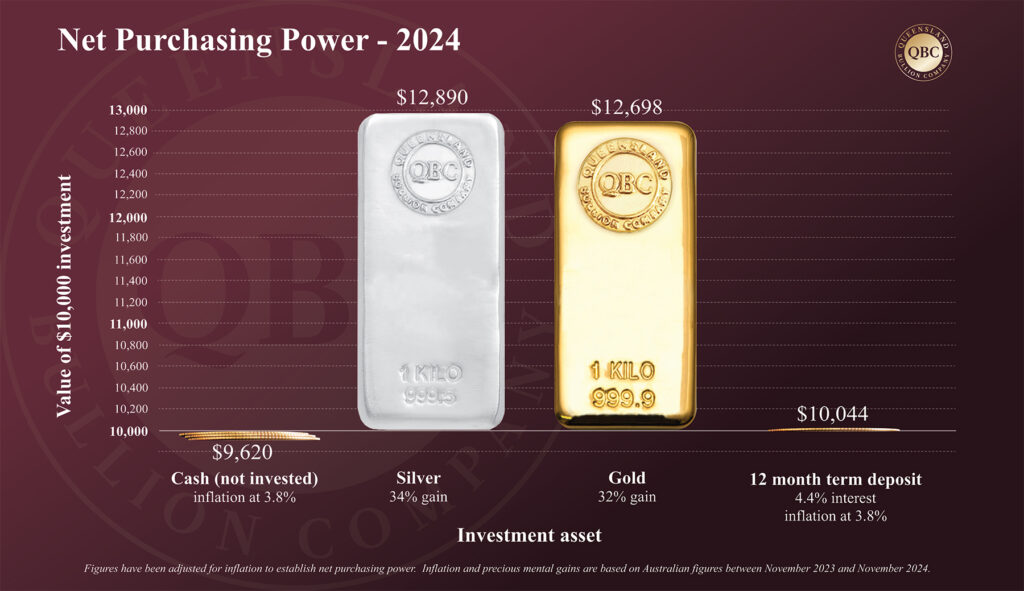Is It Better to Hold Cash or Gold in 2025?
by Johndn7In the current economic landscape, investors are increasingly asking whether they should hold their wealth in cash or whether gold bullion is a better option. While both have their place in a diversified portfolio, gold offers several compelling advantages. From a strictly financial perspective, the graph below from 2024 illustrates how gold and silver provide the best gains.
There may be other considerations on an individual basis. Below is a broad summary of some advantages and disadvantages of wealth storage options. It is important to remember that while we can provide general education, you are best to consult with your financial advisor for specifics for your circumstance.
Cash Options and Their Limitations
Cash in a Bank Account
The average Australian savings account currently offers interest rates around 0.5-1.5%. At present, this fails to keep pace with inflation. This means your money is actually losing purchasing power over time.
Physical Cash at Home
Having some emergency cash on hand might give you added short term security in a crisis. It can also help to make buying some items for cash simpler. However, keeping significant amounts at home offers zero growth potential. You also open yourself to potential security risks. Cash held at home or in a safe also steadily loses value to inflation.
Term Deposits
Even with better rates of around 4-5% on term deposits, these barely keep pace with inflation. You also need to report on interest received to the ATO and then consider any tax implications. And while you can hold value with a good fixed-term account, your money becomes inaccessible for the term agreed.
Gold’s Historical Performance
Gold has demonstrated impressive long-term performance over the past decades to have:
– increased in value approximately 730% between June 30 of 2005 and March 14, 2025;
– maintained purchasing power over centuries, unlike fiat currency;
– performed particularly well during periods of economic uncertainty.
Gold vs. Inflation
With current inflation rates hovering around 3-4%, gold has historically served as an effective hedge:
– During the high inflation period of the 1970s, gold prices increased by approximately 227% from 1975 to 1979;
– In 2022-2023, as inflation spiked globally, gold again demonstrated its value as a store of wealth
– Gold typically maintains or increases its purchasing power during inflationary periods
-The below graph shows the performance of gold versus cash storage methods in 2024. What is this graph?
Liquidity Considerations
Both cash and gold offer liquidity, but in different ways:
– Cash offers immediate spending power;
– Through Queensland Bullion Company gold can be quickly liquidated when needed, typically within 24 hours.
Tax Considerations
Gold bullion investments can offer tax advantages compared to interest-bearing accounts where every dollar of interest is taxable. When selling gold, there can be capital gains to factor in. You can also buy gold through a self-managed super fund, which may provide further tax benefits.
The 2025 Outlook
With ongoing global economic uncertainties, gold’s traditional role as a safe haven asset makes it particularly attractive in 2025. While cash serves important functions for day-to-day needs and emergency funds, gold offers superior potential for preserving and growing wealth in the current environment.
While maintaining some cash reserves might be prudent for immediate needs and emergencies, allocating a significant portion of your wealth to gold in 2025 provides a stronger hedge against inflation, better long-term growth potential, and greater protection against economic volatility.
If you have any questions about investing in gold, please call our team of experts who are happy to discuss.





